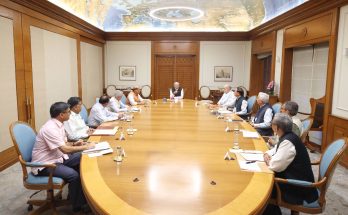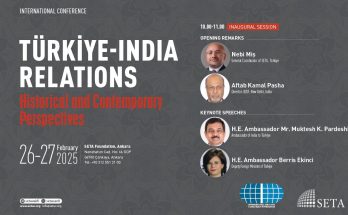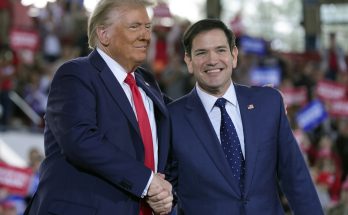
Russian President Vladimir Putin says he is satisfied with the pace of work during his country’s presidency of the Shanghai Cooperation Organization (SCO), despite the Covid pandemic and “threats” to its members, observers, and dialogue partners from outside. However, the immediate challenge is mending the economy, Mr Putin said at the virtual SCO summit, estimating a milder impact on the SCO countries compared to those in the west, with a drop of 3.2 and 4.4 percent, respectively.
Mr Putin made the remarks while presenting a report card of the activities undertaken under its presidency at the 20th meeting of the heads of the governments of the eight-member grouping held via videoconference on November 10. “We had to make adjustments to our joint agenda to accommodate a greater focus on the interaction between the member states in healthcare, protecting our citizens’ lives and health,” he said.
The SCO countries have continued to provide help and support to each other in fighting the virus, he said. Russia has donated around half a million diagnostic kits and contactless temperature taking instruments while medical teams were sent to Kazakhstan, Kyrgyzstan, Tajikistan, and Uzbekistan, and nine such missions have already been completed, he said.
Security Cooperation
Mr Putin said that more than 60 joint events were held involving government departments, parliaments, businesses, and public agencies, maintaining a high-quality of engagement during Russia’s chairmanship. Several important documents in the spheres of politics, economy, humanitarian and defence and security policies were prepared for taking up in the meeting.He said that foreign and defence policy cooperation among the SCO states has “noticeably intensified”. There have been meetings of the foreign and defence ministers as well as between the heads of defence departments of the CSTO and CIS countries. “The Russian chairmanship also continued the practice of joint exercises involving the military and special units from the SCO member states as well as our partners, including from observer countries,” he said.
Also, the year was marked by celebrations dedicated to the 75th anniversary of the end of World War II. All member states focused on holding commemorative events. Military units from the SCO countries have symbolically participated in a Victory Parade on the Red Square in Moscow.
Continuing Threats
“It is clear to everyone that the global and regional security situation remains complicated. International terrorism and drug trafficking are still major threats. The scale of cybercrime has grown perceptibly. The strategic stability system continues to deteriorate. Regrettably, violent regional conflicts are not ceasing either. Moreover, new seats of tension are emerging, including on the SCO’s external borders. Therefore, one of the key components of the SCO work is to assist peaceful crisis resolution through political and diplomatic means,” he stressed.
Besides, “a dangerous level of instability persists in the Middle East and North Africa. The armed confrontation in Libya and Yemen and the remaining pockets of bandit groups in Syria are a source of terrorist threat as well as drug and arms trafficking,” he said.He noted that the movement of terrorists has exacerbated conflicts and deserves special attention.
The Russian president described the developments in Karabakh as a “huge tragedy” and said that some progress has been made towards a compromise between Azerbaijan and Armenia for stopping the bloodshed. Another area of common concern is the “increased number of attempts of direct foreign interference” in the internal affairs of the SCO states. The “blatant infringement on sovereignty, attempts to split societies, change the countries’ path of development and sever the existing political, economic and humanitarian ties that took centuries to develop” have threatened the peace and security of the region, he said. He cited the example of Belarus, an observer country, where an attack of this kind has been directed by external forces.
Mending the Economy
President Putin said that the coronavirus pandemic has dealt a severe blow to the world economy and resulted in a global recession. “Of course, our organization has also faced difficulties. It is estimated that the economies of the SCO member states will decline by an average of 3.2 percent in 2020, which is less than elsewhere in the world, where a drop of 4.4 percent is expected.”
In this context, the SCO has developed joint measures to set the situation right; in particular, the SCO Program of Multilateral Trade and Economic Cooperation by 2035. It is aimed at overcoming negative trends in mutual trade and significantly strengthening ties in investment cooperation, finance and banking, energy, transport, and other areas, he added.
Author Profile
- India Writes Network (www.indiawrites.org) is an emerging think tank and a media-publishing company focused on international affairs & the India Story. Centre for Global India Insights is the research arm of India Writes Network. To subscribe to India and the World, write to editor@indiawrites.org. A venture of TGII Media Private Limited, a leading media, publishing and consultancy company, IWN has carved a niche for balanced and exhaustive reporting and analysis of international affairs. Eminent personalities, politicians, diplomats, authors, strategy gurus and news-makers have contributed to India Writes Network, as also “India and the World,” a magazine focused on global affairs.
Latest entries
 India and the WorldApril 23, 2025Kashmir terror: India hits back at Pakistan, highlights cross-border linkages
India and the WorldApril 23, 2025Kashmir terror: India hits back at Pakistan, highlights cross-border linkages India and the WorldApril 23, 2025The Century of America and India: Growing Together
India and the WorldApril 23, 2025The Century of America and India: Growing Together In ConversationApril 20, 2025India Can Contribute Largely to Development of Morocco’s Defence Industry: Ambassador
In ConversationApril 20, 2025India Can Contribute Largely to Development of Morocco’s Defence Industry: Ambassador India and the WorldApril 2, 2025Mapping Next Steps for BIMSTEC
India and the WorldApril 2, 2025Mapping Next Steps for BIMSTEC







